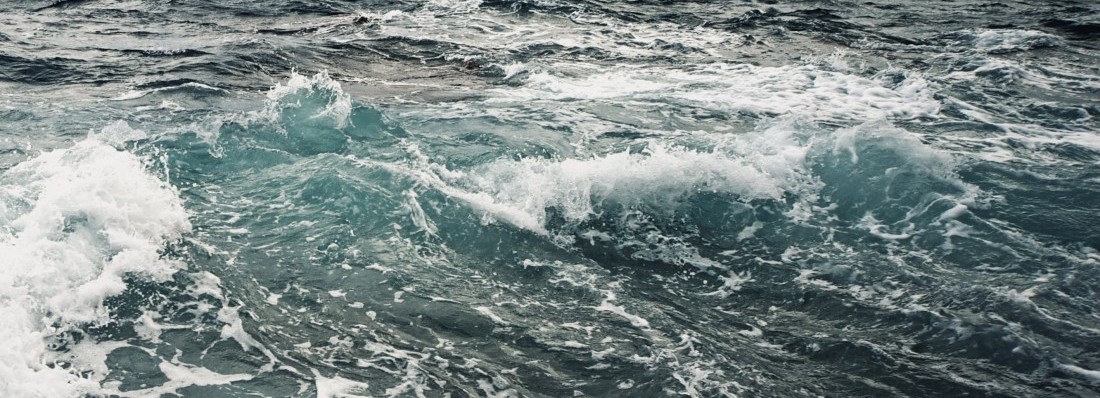
The First Sunday in Lent, Year B, 2018 – Mark 1:9-15, 1 Peter 3:18-22, Genesis 9:8-17
John’s invitation to repent and be baptized evokes a long history with God. While that history is one where God saves His people over and over again, the waters also bring up terrifying moments.
Before the waters of baptism, Israel would have been reminded of Noah and the flood. That story focuses on how God saves Noah and His family. Yet it is set in motion by God’s grief over humanity’s twisted hearts, and His decision to cleanse the earth with the flood. Pointing to the waters of baptism, John’s call to repentance reminded Israel of God’s cleansing judgment.
Right along side this association would have been that of God’s deliverance through the Red Sea and into the Promised Land. Here God hears Israel’s cries and with great signs and wonders He draws them out of Egypt. Right after they leave though Pharaoh decides to bring them back and pursues with his armies.The Israelites end up trapped between Pharaoh’s army and the Red Sea. Terrified, Israel forgets the displays of power and providence that God has just performed and they cry out to Moses, “Was it because there were no graves in Egypt that you brought us to the desert to die? …It would have been better for us to serve the Egyptians than to die in the desert.” But all is not lost. God divides the waters, brings them through safely, and Israel is reborn as a nation. Yet this rebirth continues. Over and over again during their time in the desert, Israel reverts back to that moment of despair and forgetfulness at the edge of the Red Sea, and a whole generation dies in the wilderness as they learn to trust God. Death accompanies the rebirth of the Red Sea.
Hundreds of years later before the waters of baptism, these memories would have still lingered.
The waters of baptism aren’t safe. Death and repentance go hand-in-hand.
The same is true today. Baptism invites us to true repentance because in its waters we are led to the only place of true deliverance: our death.
A bit over a year ago, a mentor from my church back home encouraged me to start going to reconciliation regularly. I am new to the Anglican church, and this is not something that I am used to. My skin crawled at the thought. All sorts of defenses went up. I didn’t need to: I confess my sins on my own and in the service all the time. Plus, does dragging myself through old mistakes really help my relationship with God? Does God need this?
So I did what every nerd does: I picked up a book. I picked up Life Together, Dietrich Bonhoeffer’s reflection on the christian life which he wrote for an illegal seminary he led until 1937.
Bonhoeffer’s reflection on confession and repentance are rich, but at its center sits the cross because true repentance requires our death. The confession that is a part of all repentance is humiliating. It requires us to acknowledge that we are not our own; we don’t write our own stories, we don’t have a right our hatreds and desires, we don’t have a right to ourselves. It requires us to look into places in our soul that we work hard to hide and forget, to concretely acknowledge before someone else those things in ourselves that we only glance at sideways. Confession before a priest or a Christian brother and sister, or apologizing to those we have wronged, they all demand that we surrender these illusions.
But perhaps just as hard is that vocalizing our confession dares us to hope that we can actually change. And some of our sins, they are really well-worn. We may not like them, but we aren’t sure there is much hope for anything else. We’ve seen ourselves through the cycle. Why would it be any different this time? Why risk the humiliation?
On our own, the waters of our baptism are just death.
The practices of Lent—fasting, almsgiving, prayer, and reconciliation—invite us to recognize that we aren’t able to submerge ourselves completely in the cold waters of repentance. Despite how we might grit our teeth and plunge forward into the repentance of John’s baptism, we cannot truly die to ourselves. We keep coming up for air.
Like it did for Israel, the repentance of these waters can only confront us with our death: a frightening recognition of our hopelessness to change and God’s righteous judgment.
But we are not the first to enter these waters.
Jesus–the spotless Lamb of God—is baptized and transforms the waters of repentance. Jesus bears the burden of perfect penitence and bears all the way to His death. Through His own death and resurrection, Christ transforms baptism and its unfolding death of repentance into the very place by which He offers us His own resurrected life. We no longer offer our attempts at repentance to God on our own. Rather, through this transformed baptism, He binds us to His own perfect self-offering and gives our ongoing “appeal[s] to God for a good conscience” hope. For reconciled to Christ, our cries come to the Father as those of His Beloved Son.
Through our death together in baptism and its continued repentance, the church finds its life together in Christ.
Let us pray:
Almighty Father, whose well-beloved Son Jesus transformed the waters of Baptism that they might be for us a source of life; create and make in us new and contrite hearts, that we, worthily lamenting our sins and acknowledging our wretchedness, may obtain of you, the God of all mercy, perfect remission and forgiveness; through your Son Jesus Christ our Lord, who lives and reigns with you and the Holy Spirit, one God, for ever and ever. Amen.
